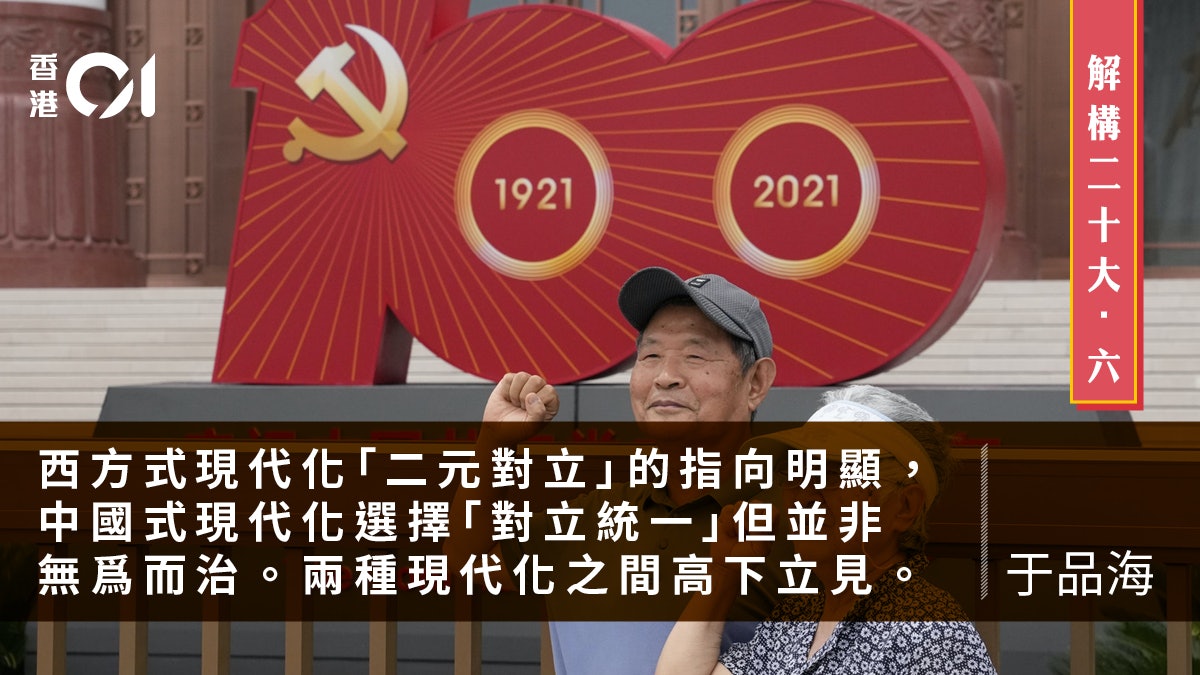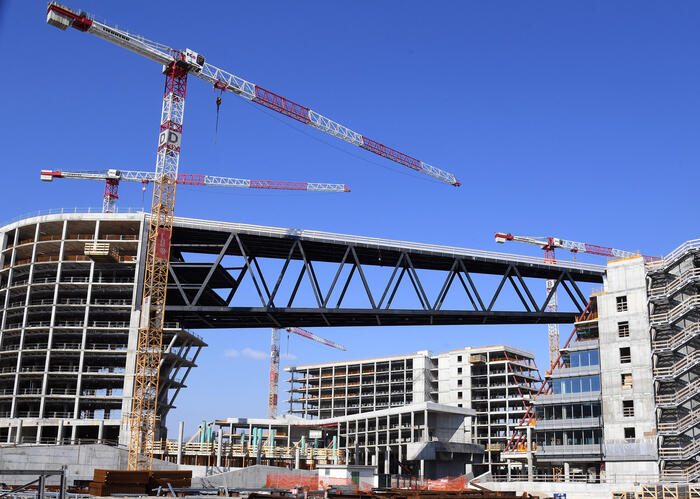[Editor’s Note] In October this year, General Secretary Xi Jinping delivered a report at the 20th National Congress of the Communist Party of China, detailing how he will lead the CCP to realize its vision of governing the country, indicating that the central task of the CCP in the future is to “unite and lead the The Chinese people will comprehensively build a modern and powerful socialist country, achieve the second centenary goal, and comprehensively promote the great rejuvenation of the Chinese nation with Chinese-style modernization.”
It may not be easy to understand the 20th National Congress report, which is more than 30,000 words in length, but it is the most direct document for understanding the strategic intentions and governance planning of the Chinese Communist Party in the coming period.
Why does the CCP, which takes Marxism as its theoretical banner, actively promote the Sinicization of the ideological field?
What is the long-term firm confidence shown by the CCP, and what is the difference between the "Chinese-style modernization" officially explained in the report and Western modernization?
How does the CCP understand Xi Jinping's "great changes unseen in a century", and what changes will China, which is at the center of the changes, bring to the world structure?
This series of articles revolves around these questions.
(sixth of ten in series)
To understand "Chinese-style modernization," one must first accept that China is a socialist country.
The report of the 20th National Congress of the Communist Party of China clearly stated: "Chinese-style modernization is socialist modernization led by the Communist Party of China." Historically, socialism and modernization have been separated, and there seems to be no close relationship between them.
Whether socialism can be modernized was once an issue in the 20th century. At that time, the target was the Soviet Union, while China was experiencing turmoil, and there was not much substantive imagination about modern times.
Although the economic strength of the Soviet Union was good, the standard of modernization was Western, so the Soviet Union could not be labeled as modern, and socialism naturally could not be compared with modern times.
In fact, "whether socialism is modern" is a false proposition.
If socialism is not modern, what is it for?
Just like "poverty is not socialism", if China is still poor, of course it cannot prove that socialism is good, but if China successfully builds socialism, then it must be modern.
However, socialist modernization is not Western-style modernization.
Socialism was born on the premise of rejecting capitalism, and of course it is a different modernization.
Poverty can be seen everywhere in Western developed societies, and many scholars have doubted whether it can continue to be described in modern terms.
"Progressive capitalism" has become popular in the United States recently, and traditional capitalism is denied, presumably because it is not progressive, and people are dissatisfied with that kind of modernization.
The Communist Party of China proposed at the 20th National Congress to "promote the great rejuvenation of the Chinese nation through Chinese-style modernization." Where does it come from?
Because "scientific socialism has shown new vitality in China in the 21st century, and Chinese-style modernization has provided a new choice for mankind to achieve modernization."
If the new choice provided by the Chinese Communist Party is placed in the context of the geopolitical game between China and the West, it will be misunderstood as socialism once again "challenging" capitalism.
The iron curtain declaration of the American diplomat George Kenan back then was to surround the socialist Soviet Union with murderous intent.
As a "new choice", "Chinese-style modernization" does have the meaning of "containing" the West, but the purpose is to prevent more developing countries from being bewitched by it, leading to social disharmony, ecological damage, and world peace. on modernization.
Before China became a model student of development, no one could imagine what a modern socialist country would be like.
Even today, the Chinese do not consider themselves modern.
Xi Jinping proposed building a modern socialist country with Chinese characteristics at the 19th National Congress, and proposed "Chinese-style modernization" at the 20th National Congress. This will not only discuss how China should modernize, but will also stimulate discussions around the world.
When discussing modernization in China more than a hundred years ago, it focused on the improvement of utensils, the introduction of institutions, and even the denial of its own civilization. It was debated whether China should "integrate Chinese culture with western application", "fully westernize" or learn from the Russian October Revolution.
In the end, the Communist Party of China, which chose a radical route, successfully led the revolution, including the all-round revolution of reform and opening up and governance, which has lasted for a hundred years so far.
More than a hundred years ago, the Chinese were only looking at modernization from a distance, and it was even a joke among scholars.
After the founding of New China and reform and opening up, modernization is no longer out of reach.
If socialism used to be incomprehensible or even doubted, "modernization" is easier to understand, and "Chinese-style modernization" directly explains what criteria the Chinese Communist Party uses to define and lead China's socialist development, and outlines its future. What path to advance along and what results to achieve.
The Commonalities and Differences Between Chinese-style and Western-style Modernization
Modernization is not just a general term for stages of human development, it also represents a series of specific life forms.
The West is regarded as the first to enter the modern society, and many people take it for granted that its lifestyle is associated with the concept of "modernity", and even regard the Western lifestyle as the standard for measuring modernization.
In recent years, due to the continuous conflicts in Western society, the widening gap between rich and poor, coupled with the rise of China and social stability, the CCP now proposes "Chinese-style modernization", which naturally leads to a comparison between the two modernizations.
The report of the 20th National Congress of the Communist Party of China stated that the common values of mankind are peace, development, fairness, justice, democracy, and freedom. This formulation seems plain and natural, but scholars who focus on the comparison of Chinese and Western systems will see the difference in the discussion.
Western-style modernization emphasizes that democracy and freedom are the greatest values of human beings. Fairness and justice will not be placed in an important position and cannot be guaranteed. Peace and development are even more embarrassing for Western countries. Bullying the good and fearing the evil are the usual methods used by the West to resolve conflicts. Development is only about oneself, not a commitment to humanity.
Where is the difference?
China promotes the construction of the "Belt and Road", and the United States and other Western countries have proposed similar plans, but developing countries have not paid attention to them. This gives the reason.
The whole world is pursuing modernization, but apart from affluent material life, it is difficult to reach a consensus on what modernity means.
The key difference between Chinese-style modernization and Western-style modernization is whether it is centered on people or centered on capital.
When the Communist Party of China defines Chinese-style modernization as "the modernization of the common prosperity of all people", it must be the modernization of people, which is based on the premise of the overall development of people, and emphasizes that it is the common prosperity of more than one billion people, rather than specious Economic modernization is not about the disorderly expansion of capital.
After the Cultural Revolution, China is at a crossroads. On the one hand, the West is undergoing huge social changes and the economy is booming. On the other hand, China needs to solve the basic needs of the people and resolve economic difficulties.
The Chinese Communist Party has chosen reform and opening up. It not only needs to solve the backward economic production capacity and encourage all people to become rich, but at the same time, it must adhere to the road of socialism.
It has found the premise understanding of the Cultural Revolution-style socialism to bring order out of chaos: socialism can develop productive forces and achieve common prosperity.
Deng Xiaoping established a brand-new basic principle for the development of socialism: 1) Poverty is not socialism, development is the last word, and only development can eradicate poverty; 2) Common prosperity does not equal the same level of wealth for the whole society, too much work is not enough ;3) Letting some people get rich first is not giving up common prosperity. It is a development strategy to get rich first and get rich later, and it also follows the law of historical materialistic development.
Under the guidance of these principles, China has become the world's second largest economy, the largest manufacturing economy and trading country, gradually entered the ranks of high-income countries, and has reached a relatively rich level in some areas.
On the contrary, developing countries imitating Western-style modernization encountered many difficulties, and most of them fell into the so-called middle-income trap. The high-income class in these countries continued to expand their wealth, while most people excluded by the barriers of vested interests stood still and wandered. on the verge of poverty.
The reasons for this are: 1) capitalism centers on the development of capital, economic activities revolve around capital, and common prosperity is not what it cares about; 2) the vast majority of people participate in economic production as laborers, and most Under these circumstances, labor lacks competitiveness in production, and the distribution income can only be calculated according to the needs of life, which has nothing to do with the accumulation of capital; 3) Western modern society is a class society, and there is no mutual support relationship between classes. The starting point for vulnerable groups to provide public services is to protect the orderly operation of capitalism.
On the surface, there should be no comparison between the two modernizations in terms of whether they have TVs, cars, or houses, but material abundance does not mean unrestrained consumption of natural resources, and it should not become consumerism and hedonism, which are decadent cultures that are rejected , not modern.
In recent years, China has gradually expanded the role of consumption in the economy and encouraged more foreign consumer goods to be imported into China. At the same time, it advocates frugality, such as CD-ROM action and cherishing the fruits of farmers' labor, hoping to build an eco-friendly and healthy consumer culture.
When digital life is equivalent to indulging in the virtual world, chemical manufacturing harms people's health, and energy consumption represents climate warming, this mode of production can continue because capital dominates Western-style modernization, and the Chinese Communist Party insists that it cannot become Chinese-style modernization Content.
The CCP’s supply-side structural reforms and the active cultivation of a healthy consumer culture are changing the once-lost balance, making products conform to people-centered standards from the very beginning.
When a developing economy can insist on the dominant position of human beings in the modernization process, Western-style modernization should reflect on whether capital is placed in the wrong place.
Focus on governance is better than endless ideological disputes
Western-style modernization emphasizes free markets, enterprises focus on corporate governance, and Chinese-style modernization focuses on state governance. This is a dialectical relationship in which objective conditions affect the behavior of subjects.
The free market allows capital to operate without constraints, corporate governance guarantees shareholder profits, and focusing on state governance can improve the happiness of the people.
When everyone evaluates preventing the disorderly expansion of capital from the perspective of capital, they must think that the CCP is turning back the wheel of history. Before that, capital could run freely in the name of the market. This is the choice of Western-style modernization.
On the contrary, the Communist Party of China, which focuses on "governing the country", believes that any behavior that disrupts social order and fairness and justice should be restrained. Once capital takes advantage of its advantages to seize the dominant power in social distribution and damage the fair business environment, Chinese-style modernization will be impossible. If it continues, the CCP will of course take action.
Whether the techniques are clumsy or not is one thing, but constraints must still be met, and skills can be gradually improved.
If the CCP wants to be in power for a long time, it must constantly optimize the Chinese-style modernization centered on state governance. It can better satisfy the people's yearning for a happy life than the Western-style modernization that only emphasizes ideology.
The West believes that China lacks freedom and democracy, and only a free economy can develop democracy, so China cannot achieve modernization.
In the early days of reform and opening up, the planned economy hindered China's development, and later it was revised to a "socialist market economy." Western economists ridiculed it as nondescript. After China's successful development, critics automatically fell silent.
Another common accusation is that autocracy cannot encourage innovation and develop high technology, and China can only rely on selling cheap labor.
This judgment has long been denied by reality.
The West also believes that the CCP regime is unstable, and no matter how successful the economy is, there will be regime change due to lack of democracy, but China has become one of the most stable regimes and societies in the world.
In recent years, China's "whole-process democracy" has created a problem for the West, which suffers from its own democratic disorder. They are no longer able to ridicule, and no one is willing to bet on the success of Chinese-style modernization.
Modernization is not authoritarian, it should be democratic and free, but it also requires fairness and justice.
"Chinese-style modernization" agrees with these requirements, but will not follow Western standards.
The CCP will question whether a free economy can solve poverty and development, and provide boundaries and order to the market; it will also argue that gun ownership is not related to freedom, but to the safety of public life.
Freedom of speech is very important, but money dominates elections under the pretext of freedom of speech. As a result, politics is monopolized by capital.
Chinese-style modernization puts fairness and justice before democracy and freedom, focuses on state governance, emphasizes preventing the disorderly expansion of capital, and attaches importance to fair and reasonable distribution, which is to get rid of the fetters of ideology.
Why does the CCP attach importance to social unification of thought and focus the discussion on governance?
Because the orderly development of the economy and society provides a guarantee for fairness and justice.
The Communist Party of China resolutely prevents the disorderly expansion of capital, the purpose is to make the governance of the country pure, emphasizing social order and fairness.
Capital believes that the government threatens its interests, and it wants to fight for an unfettered free market. The two seem to be incompatible. However, there is no freedom without order.
Western-style modernization emphasizes "small government, big market", and the direction of "dual opposition" is obvious; Chinese-style modernization chooses "unity of opposites", but it does not rule by doing nothing. to play the role of the government.”
Competence between the two modernizations.
"Deconstructing the Top 20" series of articles:
Deconstruct the 20th National Congress.
1|Why should we read the report of the 20th National Congress of the Communist Party of China and deconstruct the 20th National Congress.
2|From the structure of the report to sort out the overall context and deconstruct the 20th National Congress of the Communist Party of China.
3|The Sinicization and Deconstruction of the Chinese Communist Party's Ideology at the 20th National Congress of the Communist Party of China.
4|Understanding how the Chinese Communist Party has been in power for a long time and deconstructed the 20th National Congress.
5|What is the new development concept and new development pattern deconstruction of the 20th Congress.
Six|Comparison of two modernizations









/cloudfront-eu-central-1.images.arcpublishing.com/prisa/FGG3RYX4FGONWMZRVKVKHSU33I.jpg)





